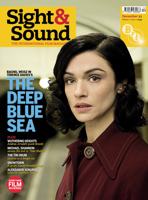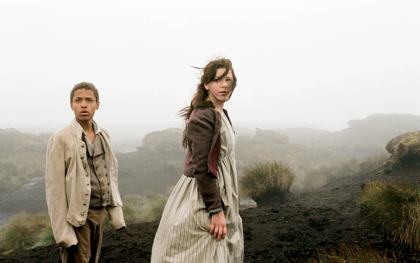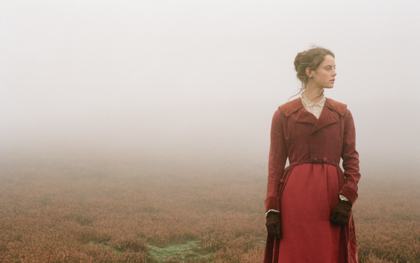Primary navigation


Stripping away the literary, romantic and supernatural trappings of Emily Brontë’s famous novel, Andrea Arnold’s elemental new reading is powerful if lop-sided, says Kate Stables
Emily Brontë’s famous novel is rugged terrain that’s been tramped enthusiastically by film adapters as various as silent director A.V. Bramble (no prints of his 1920 version are known to survive, sadly), Luis Buñuel and Jacques Rivette, its most famous incarnation being William Wyler’s 1939 Hollywood romance. It’s even been transplanted to California as an MTV teen musical, and has appeared as numerous period TV adaptations. Yet Andrea Arnold’s stark, defiantly naturalistic new version succeeds brilliantly in injecting the shock of the new into this well-thumbed English classic.
Her rough, elemental reading of Wuthering Heights, replete with casual brutality, Ted Hughes-like scrutiny of wildlife both dead and alive and Heathcliff’s sullen cries of “Fook off”, will jolt audiences weaned on the romantic tropes of previous versions just as Brontë’s uncouth beast of a book did its Victorian readers. Stripping away the literary, romantic and supernatural trappings, Arnold has substituted her signature social realism, gutting the gothic framework of the novel and recasting the story from Heathcliff’s point of view from his arrival as an Afro-Caribbean runaway slave rescued in Liverpool and brought to a bleak Yorkshire hill farm. The only things embraced wholeheartedly from her source beyond its dark central obsession are the harsh yet beautiful landscape and the relentlessly raw weather, which pass beyond ‘pathetic fallacy’ status thanks to Nicolas Becker’s birdsong-flecked, wind-whipped sound design to become almost characters in their own right.
There’s an invigorating rather than incongruous whiff of predecessor Fish Tank (2009) in the weaving handheld camerawork, the use of taciturn non-professional actors and the portrayal of Heathcliff as the young, marginalised outsider whose wary, jealous eye cinematographer Robbie Ryan’s camera adopts. Rather in the spirit of Cathy’s famous cry of “I am Heathcliff,” the sidling, spying glances through door cracks and greedy, languorous gazing at wild nature and wilder Cathy make Heathcliff’s plight and hardships something deeply felt rather than stiffly observed.
His race and class difference (“He ain’t my brother, he’s a nigger,” snarls brutish heir Hindley) colours every exchange, fuelling newcomer Solomon Glave’s mulishly blank-faced yet broodingly expressive performance. All the while the camera wraps around young Cathy and Heathcliff like a blanket, binding us into their stubborn, instinctual affection for one another as they play-fight on the moors, or Cathy delicately licks the blood off the whip-marks that he’s earned by defying Hindley.

Wuthering Heights privileges its austere and gorgeous images heavily over speech, as part of the film’s rejection of the literary template of most adaptations. While this suits the feral intensity of the childhood half of the narrative, it deprives us of the fierce gusts of confession that animate the novel, and contributes to a certain heavyhandedness in the lovers’ reunion here. Denied the verbal duelling that made the recent Jane Eyre crackle or Bright Star (2009) shudder with suppressed longing, Cathy and Heathcliff flail sulkily at one another to signal mutual desire, and non-professional actor James Howson is reduced to skulking and scowling to convey the wretchedness of the adult Heathcliff.
Since the film also bravely abjures the artificiality of a music score, it can be an effort to connect with the characters’ emotions, which seem highly coloured and choked-off simultaneously. A wraith-like Kaya Scodelario makes a brief, trembling mark as the rapidly ailing adult Cathy, but there’s misery rather than chemistry in their groaning, clutching reconciliation. Passion is confined to a handful of arresting but perverse gestures – Heathcliff sinking his teeth into Isabella Linton’s lip or fondling Cathy’s laid-out corpse with necrophiliac ardour.
Nothing in the dawdling, overwrought second half can match the sensuous immersion of the childhood scenes, and frequent flashbacks to that rough-and-tumble idyll only highlight this disparity in emotional force. Just at the point when Wuthering Heights should be wringing your heart, you find it’s merely wringing its hands instead.
The Brits are sailing: Kieron Corless previews Wuthering Heights and this year’s British contingent at the Venice Film Festival (September 2011)
Romantic setting: Jane Campion talks to Nick James about Bright Star, her portrait of Keats in love (December 2009)
Mean streets: Hannah McGill on Red Road (November 2006)